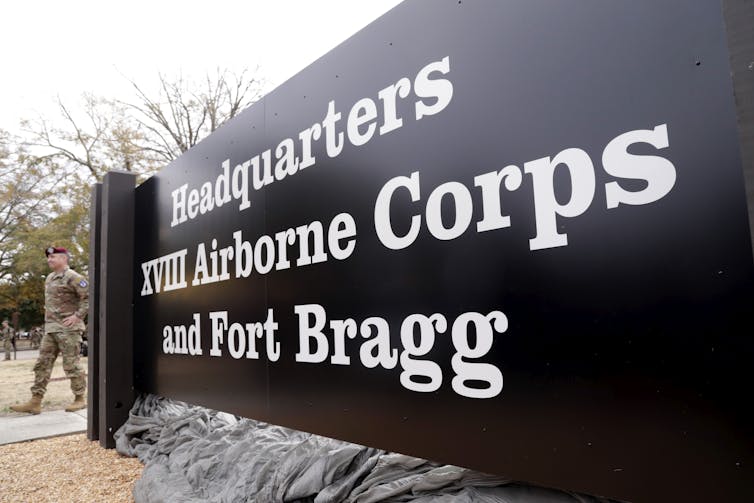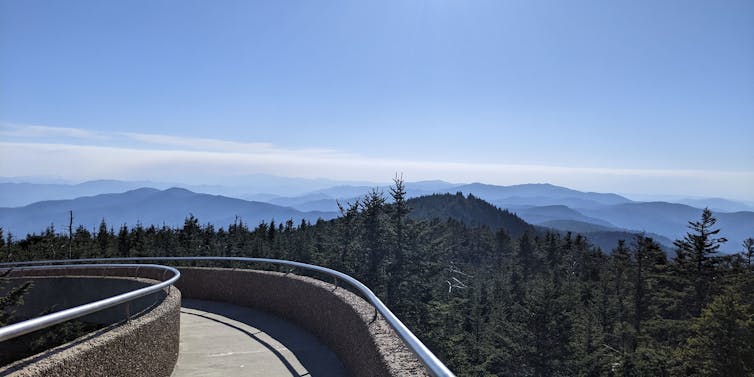Place names are extra than simply labels on a map. They affect how individuals study concerning the world round them and understand their place in it.
Names can ship messages and recommend what’s and isn’t valued in society. And the way in which that they’re modified over time can sign cultural shifts.
America is within the midst of a place-renaming second. From the renaming of the Gulf of Mexico to the Gulf of America, to the return of Forts Bragg and Benning and the newly re-renamed Mount McKinley in Alaska’s Denali Nationwide Park, we’re witnessing a consequential shift within the politics of place naming.
This sudden rewriting of the nation’s map – carried out to “restore American greatness,” in keeping with President Donald Trump’s government order that made a few of them official – is a part of a reputation sport that acknowledges place names as highly effective manufacturers and political instruments.
In our analysis on place naming, we discover how this “name game” is used to claim management over shared symbols and embed delicate and not-so-subtle messages within the panorama.
As geography academics and researchers, we additionally acknowledge the tutorial and emotional affect the identify sport can have on the general public.
Place names can have psychological results
Renaming a spot is at all times an act of energy.
Individuals in energy have lengthy used place naming to say management over the id of the place, bolster their reputations, retaliate in opposition to opponents and obtain political targets.
These strikes can have sturdy psychological results, significantly when the identify evokes one thing threatening. Altering a spot identify can essentially shift how individuals view, relate to or really feel that they belong inside that place.
In Shenandoah County, Virginia, college students at two faculties initially named for Accomplice generals have been on an emotional curler coaster of identify modifications in recent times. The colleges had been renamed Mountain View and Honey Run in 2020 amid the nationwide uproar over the homicide of George Floyd, a Black man killed by a police officer in Minneapolis.
4 years later, the native college board reinstated the unique Accomplice names after conservatives took management of the board.
One Black eighth grader at Mountain View Excessive Faculty — now re-renamed Stonewall Jackson Excessive Faculty — testified at a board assembly about how the deliberate change would have an effect on her:
“I would have to represent a man that fought for my ancestors to be slaves. If this board decides to restore the names, I would not feel like I was valued and respected,” she stated. The board nonetheless accepted the change, 5-1.
Even outdoors of colleges, place names function as a “hidden curriculum.” They supply narratives to the general public about how the group or nation sees itself – in addition to whose histories and views it considers essential or worthy of public consideration.
Place names have an effect on how individuals understand, expertise and emotionally hook up with their environment in each aware and unconscious methods. Psychologists, sociologists and geographers have explored how this sense of place manifests itself into the psyche, creating both attachment or aversion to position, whether or not it’s a faculty, mountain or park.
A story of two forts
Renaming locations can rally a pacesetter’s supporters by means of rebranding.
Trump’s orders to revive the names Fort Bragg and Fort Benning, each initially named for Accomplice generals, illustrate this impact. The names had been modified to Fort Liberty and Fort Moore in 2023 after Congress handed a regulation banning the usage of Accomplice names for federal installations.
Veterans and different company posed in 2023 subsequent to a newly unveiled signal for Fort Moore, named for Lt. Gen. Harold ‘Hal’ Moore, who served in Vietnam, and his spouse, Julia Moore. In 2025, President Donald Trump reverted the identify again to Fort Benning.
Cheney Orr/AFP through Getty Photographs
Trump made a marketing campaign promise to his followers to “bring back the name” of Fort Bragg if reelected.
To get across the federal ban, Protection Secretary Pete Hegseth recognized two unrelated embellished Military veterans with the identical final names — Bragg and Benning — however with none Accomplice connections, to honor as an alternative.
Name it a sleight of hand or a stroke of genius if you happen to’d like, this tactic allowed the Division of Protection to revive politically charged names with out violating the regulation.

A soldier walks beside an indication that was unveiled when Fort Liberty was rededicated as Fort Bragg throughout a ceremony on base on March 7, 2025.
AP Picture/Chris Seward
The restoration of the names Bragg and Benning might really feel like a symbolic homecoming for individuals who resisted the unique identify change or have emotional ties to the names by means of their reminiscences of dwelling and serving on the bottom, reasonably than a connection to the particular namesakes.
Nevertheless, the names are nonetheless reminders of the navy bases’ authentic affiliation with defenders of slavery.
The place-renaming sport
A wave of place-name modifications in the course of the Obama and Biden administrations centered on eradicating offensive or derogatory place names and recognizing Indigenous names.
For instance, Clingmans Dome, the very best peak within the Nice Smoky Mountains, was renamed to Kuwohi in September 2024, shifting the identify from a Accomplice normal to a Cherokee phrase which means “the mulberry place.”
Beneath the Trump administration, nonetheless, place-name modifications are being superior explicitly to push again in opposition to reform efforts, a part of a broader assault on what Trump calls “woke culture.”

The view from a lookout tower on Kuwohi, previously generally known as Clingmans Dome, within the Nice Smoky Mountains.
Nationwide Park Service
President Barack Obama modified Alaska’s Mount McKinley to Denali in 2015 to acknowledge Indigenous heritage and a long-standing identify for the mountain. Officers in Alaska had requested the identify change to Denali years earlier and supported the identify change in 2015.
Trump, on his first day in workplace in January 2025, moved to rename Denali again to Mount McKinley, over the opposition of Republican politicians in Alaska. The state Legislature handed a decision a couple of days later asking Trump to rethink.
Georgia Rep. Earl “Buddy” Carter made a latest legislative proposal to rename Greenland as “Red, White, and Blueland” in help of Trump’s expansionist want to buy the island, which is an autonomous territory of Denmark.
Danish officers and Greenlanders noticed Carter’s absurd proposal as insulting and damaging to diplomatic relations. It isn’t the primary time that place renaming has been used as a type of symbolic insult in worldwide relations.
Renaming the Gulf of Mexico to Gulf of America may need initially appeared inconceivable, however it’s already mirrored in frequent navigation apps.
Google Maps shows the identify ‘Gulf of America’ as an alternative of Gulf of Mexico in March 2025.
Google INEGI
A greater approach to decide on place names
When leaders rename a spot in an abrupt, unilateral trend — typically for ideological causes — they threat alienating communities that deeply join with these names as a type of reminiscence, id and place attachment.
A greater different, in our view, could be to make renaming shared landscapes participatory, with alternatives for significant public involvement within the renaming course of.
This strategy doesn’t keep away from identify modifications, but it surely suggests the modifications ought to reply to the social and psychological wants of communities and the evolving cultural id of locations — and never merely be used to attain political factors.
As a substitute, encouraging public participation — reminiscent of by means of panorama affect assessments and significant audits that take the wants of affected communities significantly — can domesticate a way of shared possession within the resolution that will give these names extra endurance.
The newest place renamings are already affecting the classroom expertise. College students are usually not simply memorizing new place labels, however they’re additionally being requested to reevaluate the which means of these locations and their very own relationship with the nation and the world.
As historical past has proven world wide, one of many main downsides of leaders imposing identify modifications is that the names will be simply changed as quickly as the subsequent regime takes energy. The end result could be a endless identify sport.




